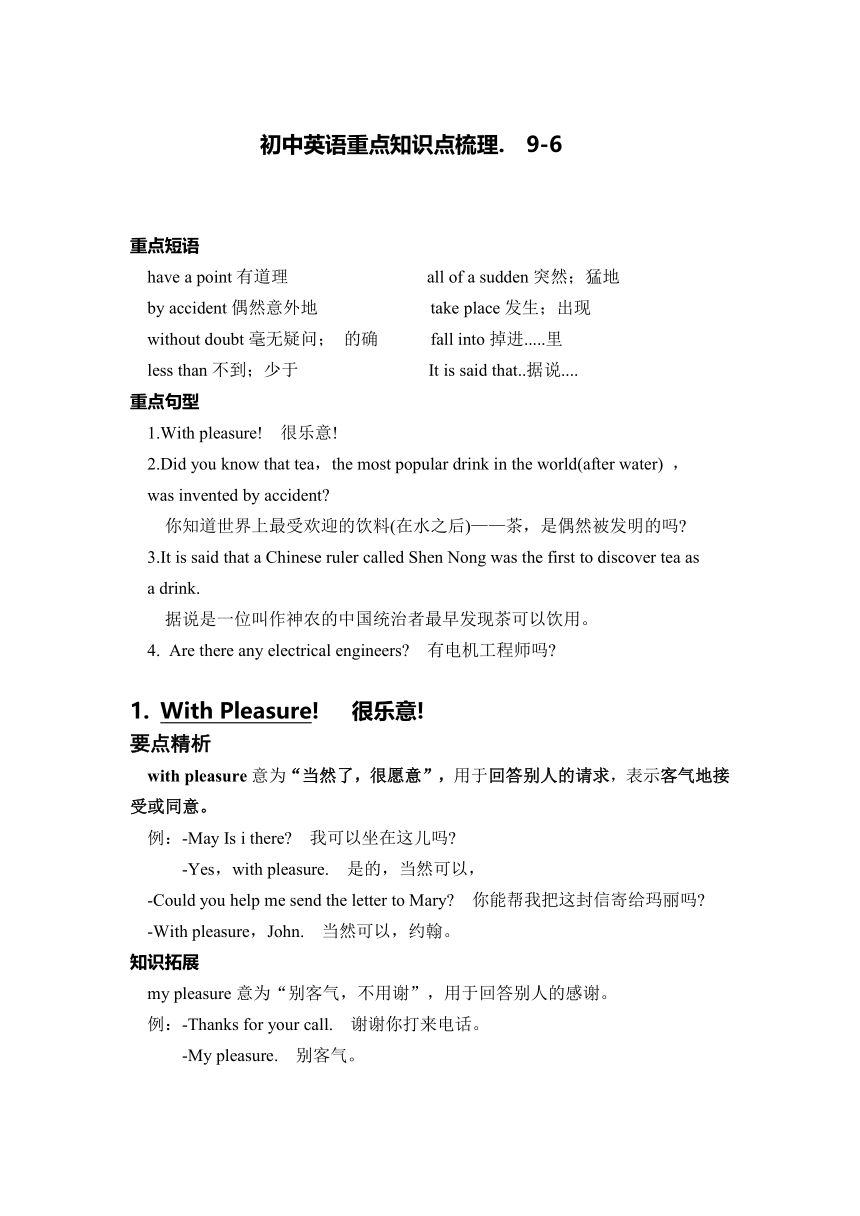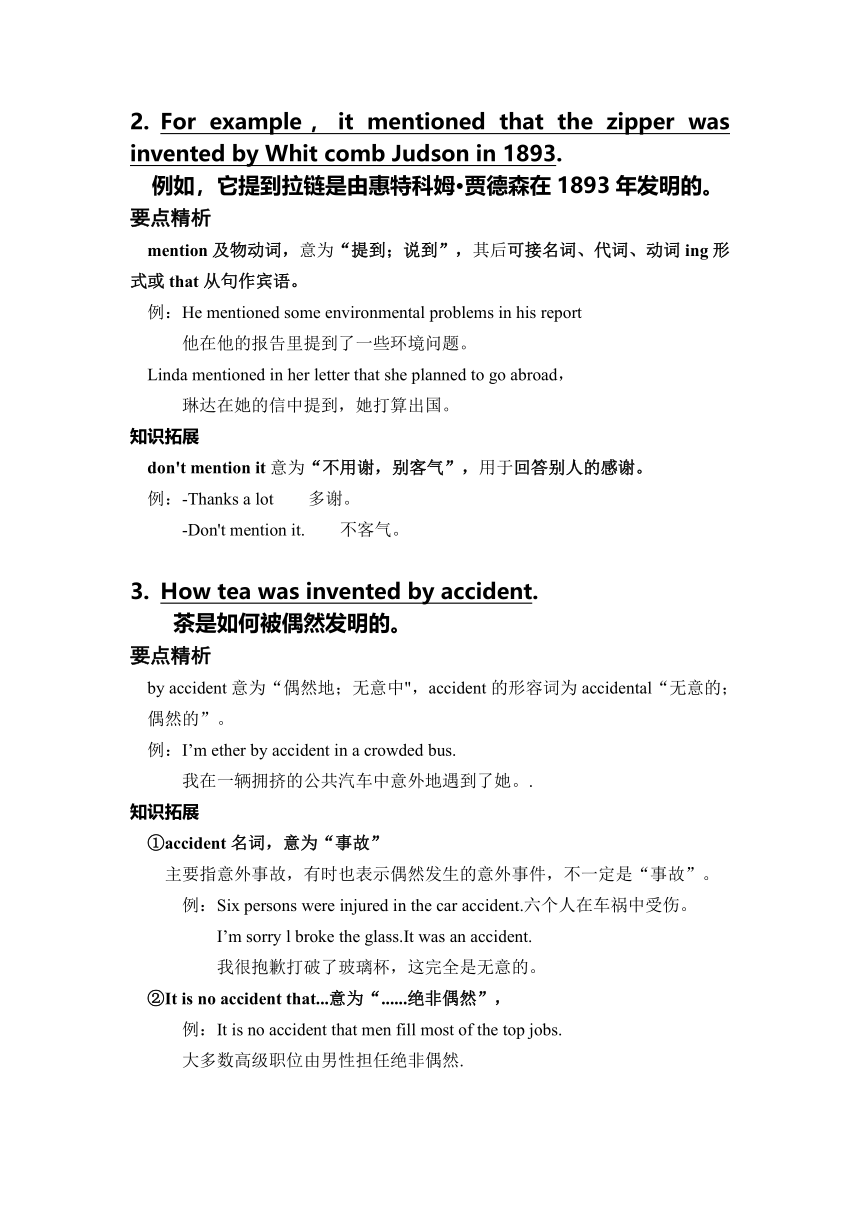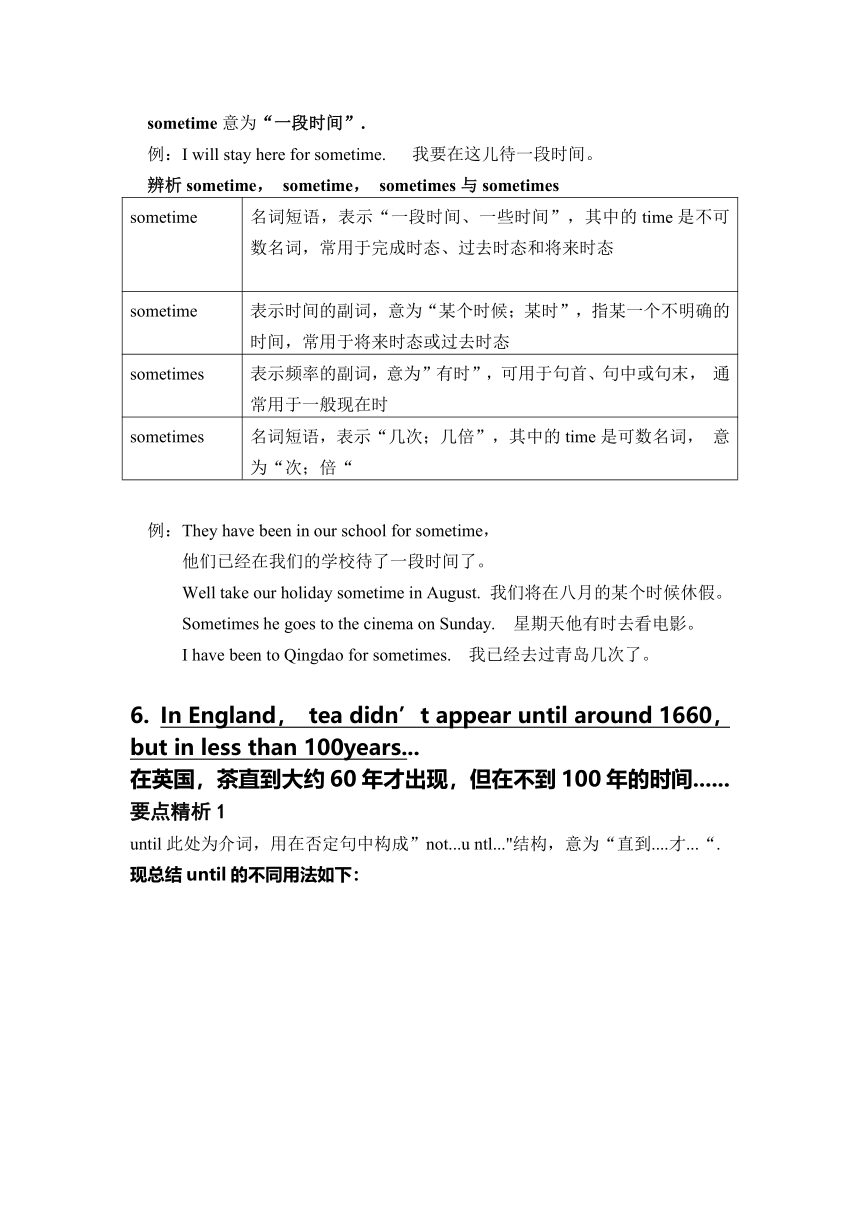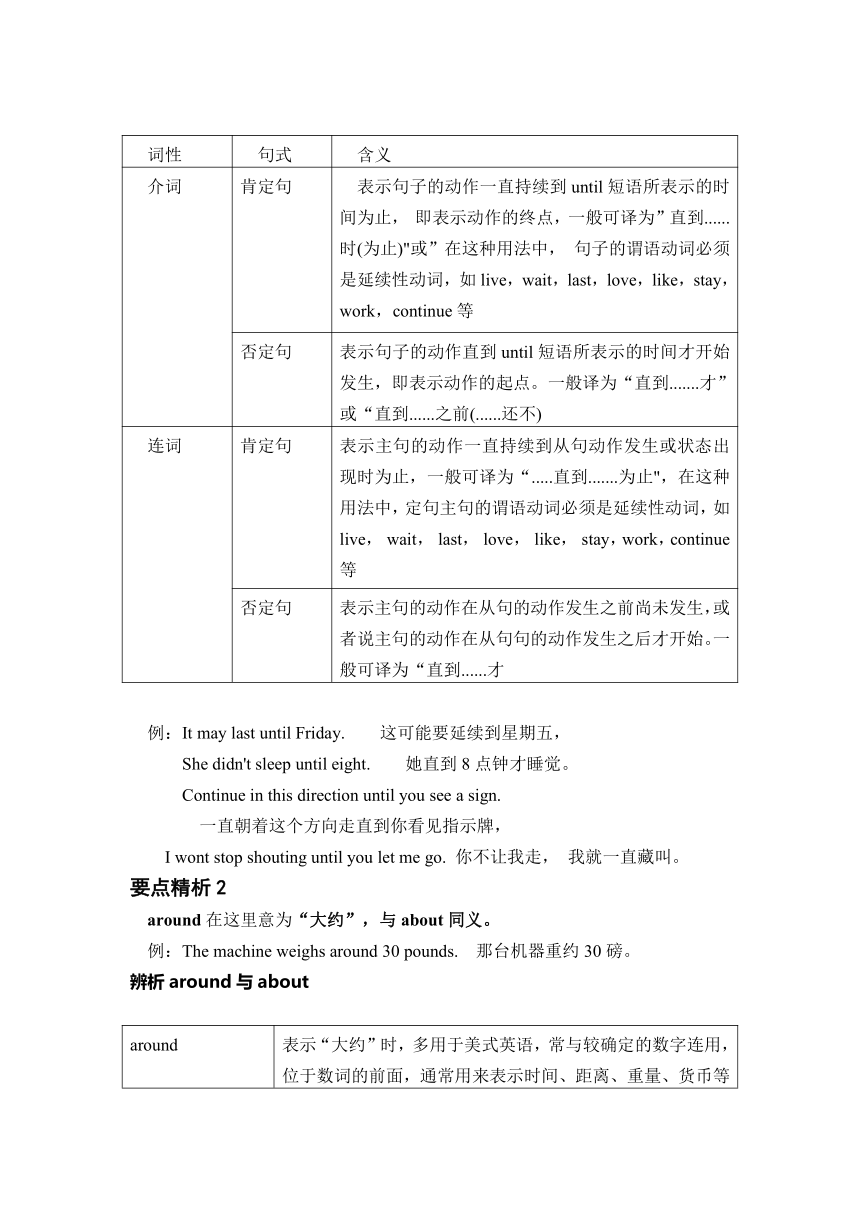人教版英语九年级全册 Unit 6 When was it invented 讲义(知识梳理和练习)
文档属性
| 名称 | 人教版英语九年级全册 Unit 6 When was it invented 讲义(知识梳理和练习) |  | |
| 格式 | docx | ||
| 文件大小 | 47.4KB | ||
| 资源类型 | 教案 | ||
| 版本资源 | 人教新目标(Go for it)版 | ||
| 科目 | 英语 | ||
| 更新时间 | 2021-08-24 15:46:51 | ||
图片预览





文档简介
初中英语重点知识点梳理.
9-6
重点短语
have
a
point有道理
all
of
a
sudden突然;猛地
by
accident偶然意外地
take
place发生;出现
without
doubt毫无疑问;
的确
fall
into掉进.....里
less
than不到;少于
It
is
said
that..据说....
重点句型
1.With
pleasure!
很乐意!
2.Did
you
know
that
tea,the
most
popular
drink
in
the
world(after
water)
,
was
invented
by
accident?
你知道世界上最受欢迎的饮料(在水之后)——茶,是偶然被发明的吗?
3.It
is
said
that
a
Chinese
ruler
called
Shen
Nong
was
the
first
to
discover
tea
as
a
drink.
据说是一位叫作神农的中国统治者最早发现茶可以饮用。
Are
there
any
electrical
engineers?
有电机工程师吗?
With
Pleasure!
很乐意!
要点精析
with
pleasure意为“当然了,很愿意”,用于回答别人的请求,表示客气地接受或同意。
例:-May
Is
i
there?
我可以坐在这儿吗?
-Yes,with
pleasure.
是的,当然可以,
-Could
you
help
me
send
the
letter
to
Mary?
你能帮我把这封信寄给玛丽吗?
-With
pleasure,John.
当然可以,约翰。
知识拓展
my
pleasure意为“别客气,不用谢”,用于回答别人的感谢。
例:-Thanks
for
your
call.
谢谢你打来电话。
-My
pleasure.
别客气。
For
example,it
mentioned
that
the
zipper
was
invented
by
Whit
comb
Judson
in
1893.
例如,它提到拉链是由惠特科姆·贾德森在1893年发明的。
要点精析
mention及物动词,意为“提到;说到”,其后可接名词、代词、动词ing形式或that从句作宾语。
例:He
mentioned
some
environmental
problems
in
his
report
他在他的报告里提到了一些环境问题。
Linda
mentioned
in
her
letter
that
she
planned
to
go
abroad,
琳达在她的信中提到,她打算出国。
知识拓展
don't
mention
it意为“不用谢,别客气”,用于回答别人的感谢。
例:-Thanks
a
lot
多谢。
-Don't
mention
it.
不客气。
How
tea
was
invented
by
accident.
茶是如何被偶然发明的。
要点精析
by
accident意为“偶然地;无意中",accident的形容词为accidental“无意的;
偶然的”。
例:I’m
ether
by
accident
in
a
crowded
bus.
我在一辆拥挤的公共汽车中意外地遇到了她。.
知识拓展
①accident名词,意为“事故”
主要指意外事故,有时也表示偶然发生的意外事件,不一定是“事故”。
例:Six
persons
were
injured
in
the
car
accident.六个人在车祸中受伤。
I’m
sorry
l
broke
the
glass.It
was
an
accident.
我很抱歉打破了玻璃杯,这完全是无意的。
②It
is
no
accident
that...意为“......绝非偶然”,
例:It
is
no
accident
that
men
fill
most
of
the
top
jobs.
大多数高级职位由男性担任绝非偶然.
It
is
said
that
a
Chinese
ruler
called
Shen
Nong
was
the
first
to
discover
tea
as
a
drink.
据说是一位叫作神农的中国统治者最早发现茶可以饮用。
要点精析
“It
is
said
that从句”是含有that从句的一种复合句,
式主语是it,
that引导的从句作真正的主语,意为“据说......”,相当于People
say
that....
使用该句型时,
that从句的谓语动词可根据需要用各种时态,
例:It
is
said
that
they
have
won
the
game.
据说他们已经赢得了那场比赛。
It
is
said
that
they
will
go
abroad
soon.
据说,
他们不久将要出国。
知识拓属
类似的句型还有:
It
is
reported
that...
据报道......
It
is(well)
known
that...
众所周知......
It
is
believed
that...
人们认为.....
It
is
supposed
that...
据猜测.....
Some
leaves
from
a
tea
plant
fell
into
the
water
and
remained
there
for
sometime.
茶树上的一些叶子掉进了水里井在里面停留了一段时间。
要点精析1
fall
into意为“落入;陷入”.
例:We
played
a
trick
on
him
and
he
fell
right
into
it.
我们给他设了个圈套,他正好中计了。
要点精析2
remain此处用作不及物动词,意为“停留;逗留".
例:He
remained
in
his
office
all
the
afternoon.
他整个下午都待在他的办公室。
知识拓展
remain作连系动词,表示“仍然是(处于某种状态)
;保持不变”,相当于keep。其后可接形容词、名词、分词或介词短语作表语。
例:He
is
in
danger,but
he
remains
calm.
尽管处于危险中,但他依然镇定。
She
remained
sitting
when
I
came.
当我进来时,她仍然坐着。
要点精析3
sometime意为“一段时间”.
例:I
will
stay
here
for
sometime.
我要在这儿待一段时间。
辨析sometime,
sometime,
sometimes与sometimes
sometime
名词短语,表示“一段时间、一些时间”,其中的time是不可数名词,常用于完成时态、过去时态和将来时态
sometime
表示时间的副词,意为“某个时候;某时”,指某一个不明确的时间,常用于将来时态或过去时态
sometimes
表示频率的副词,意为”有时”,可用于句首、句中或句末,
通常用于一般现在时
sometimes
名词短语,表示“几次;几倍”,其中的time是可数名词,
意为“次;倍“
例:They
have
been
in
our
school
for
sometime,
他们已经在我们的学校待了一段时间了。
Well
take
our
holiday
sometime
in
August.
我们将在八月的某个时候休假。
Sometimes
he
goes
to
the
cinema
on
Sunday.
星期天他有时去看电影。
I
have
been
to
Qingdao
for
sometimes.
我已经去过青岛几次了。
In
England,
tea
didn’t
appear
until
around
1660,
but
in
less
than
100years...
在英国,
茶直到大约60年才出现,
但在不到100年的时间......
要点精析1
until此处为介词,用在否定句中构成”not...u
ntl..."结构,意为“直到....才...“.
现总结until的不同用法如下:
词性
句式
含义
介词
肯定句
表示句子的动作一直持续到until短语所表示的时间为止,
即表示动作的终点,一般可译为”直到......时(为止)"或”在这种用法中,
句子的谓语动词必须是延续性动词,如live,wait,last,love,like,stay,work,continue等
否定句
表示句子的动作直到until短语所表示的时间才开始发生,即表示动作的起点。一般译为“直到.......才”或“直到......之前(......还不)
连词
肯定句
表示主句的动作一直持续到从句动作发生或状态出现时为止,一般可译为“.....直到.......为止",在这种用法中,定句主句的谓语动词必须是延续性动词,如live,
wait,
last,
love,
like,
stay,work,continue等
否定句
表示主句的动作在从句的动作发生之前尚未发生,或者说主句的动作在从句句的动作发生之后才开始。一般可译为“直到......才
例:It
may
last
until
Friday.
这可能要延续到星期五,
She
didn't
sleep
until
eight.
她直到8点钟才睡觉。
Continue
in
this
direction
until
you
see
a
sign.
一直朝着这个方向走直到你看见指示牌,
I
wont
stop
shouting
until
you
let
me
go.
你不让我走,
我就一直藏叫。
要点精析2
around在这里意为“大约”,与about同义。
例:The
machine
weighs
around
30
pounds.
那台机器重约30磅。
辨析around与about
around
表示“大约”时,多用于美式英语,常与较确定的数字连用,位于数词的前面,通常用来表示时间、距离、重量、货币等
about
表示”大约”时,常与较确定的数字连用,位于数词的前面,多修饰时间、年龄和日期
例:The
company
has
around$1.3bllionindebt.
那家公司有大约13亿美元的债务。
It's
about
ten
o'clock
now.
现在大约十点。
The
girl
is
about
ten
years
old.
那个女孩儿大约十岁,
要点精析3
less
than意为“不到;
少于”,其反义词组是more
than,意为“多于”。
例:-How
often
do
you
exercise?你多长时间锻炼一次?
-Less
than
four
days.
不到四天。
I
eat
fish
less
than
twice
a
week.
我每周吃鱼不到两次。
I
take
a
walk
more
than
five
times
a
week.我每周散步多于五次。
The
earthquake
happened
all
of
a
sudden...
地震突然发生......
要点精析
all
of
a
sudden意为“突然地”
例:The
girl
began
crying
all
of
a
sudden.
这个女孩儿实然开始哭了起来,
知识拓屏
①sudden
adj.突然的;意外的.
例:His
sudden
death
made
his
family
very
sad.
他的突然去世使他的家人很悲伤。
②suddenly
adv.突然地。
例:Suddenly
her
an
out
of
the
house
without
a
word.
突然,他一句话都没说就跑出了房子。
Potato
chips
were
invented
by
mistake.
薯片是无意间被发明的。
要点精析
by
mistake意为“错误地;无意中”
例:I
took
your
bag
by
mistake.
我错拿了你的包。
知识拓展
由mistake构成的常用短语:
by
mistake
错误地无意中
make
a
mistake/make
mistakes
犯错误
make
a
mistake
about
误解
mistake..for.
把......错认成
例:He
took
my
book
by
mistake.
他错拿了我的书。
Don't
be
afraid
of
making
mistakes
when
you
speak
English
当你讲英语的时候,不要怕出错。
George
wanted
to
make
the
customer
happy.
乔治想让这位顾客高兴。
要点精析
make+sb.+adj.意为“使某人......".形容词作宾语补足语,说明宾语的状态、性质、特征等.
例:The
loud
noise
at
night
real
made
some
old
people
angry.
晚上巨大的噪音真的使一些老年人很生气。
知识拓展
make在句子中与不同的词连用表示的含义不同:
①make+名词,make意为“做;制作”.
例:I
will
make
a
cake
for
Jenny.
我将为詹妮做一个蛋糕,
②make+宾语+宾补,
make意为“使;使得”。
例:The
news
makes
me
very
happy.
这个消息使我很高兴,
①make+宾语+动词原形,意为“使/让某人做某事”。
例:Don't
make
the
baby
cry.
不要让这个婴儿哭了
④make+间接宾语+直接宾语,意为“给某人做某事”,
例:I’ll
make
you
some
sandwiches.
我将给你做些三明治。
Basketball
was
invented
by
a
Canadian
doctor
named
James
Naismith,who
was
born
in
1861.
篮球是由一位名叫詹姆斯·亲史密斯的加拿大博士发明的,他出生于1861年。
要点精析1
过去分词短语named
James
Naismith作后置定语,相当于定语从句who
was
named
James
Naismith,过去分词短语作后置定语的结构通常可以理解为“被....”
例:I
know
the
boy
named
Tom.
我认识那个叫汤姆的男孩儿。
要点精析2
who
was
born
in
1861是一个非限制性定语从句。非限制性定语从句起补充说明作用,省去后不影响主句的意思,并且常用逗号与主句分开,翻译时常译成井列的分句.
例:Our
classroom
is
cleaned
by
Tom
everyday
who
is
always
the
first
one
to
get
to
school
每天我们的教室都由汤姆打扫,他总是第一个到达学校的人。
Dr
Naismith
divided
the
men
in
his
class
into
two
teams
and
taught
them
to
play
his
new
game.
奈史密斯博士将他班里的男生分成两队井教他们进行新运动。
要点精析
divide及物动词,意为“分开;分割”。divide...into...与separate...into...同义,
意为“把......分成......”,此短语可以用于被动语态,即be
divided
into...,意为“被分成......”.
例:He
divided
us
into
four
groups.
他把我们分成了四组。
We
were
divided
into
four
groups
by
him.
我们被他分成了四组。
At
the
same
time,they
need
to
stop
the
competing
team
from
getting
the
ball
into
their
own
basket.
同时,他们需要阻止对方把球投到他们自己的篮筐里。
要点精析1
at
the
same
time意为“同时。
例:You
can
do
anything
you
want,but
not
everything
at
the
same
time.
你可以做任何你想要做的事,但你不能同时做所有的事,
知识拓展
at
the
same
time还表示“尽管如此;虽然;但是”。
例:It
will
cost
a
lot
of
money.At
the
same
time
I
think
we
shall
need
it
and
it
will
certainly
be
useful.
它将花费许多钱,但是我认为我们需要它,而且它一定会有用的。
要点精析2
stop...(from)
doing
sth.意为“阻止......做某事”
例:It’s
hard
to
stop
people
going
shopping
online.
阻止人们网上购物是很难的。
知识拓展
“阻止......做某事”还可用keep
from
doing
sth.for
prevent.(from)
doing
sth.表示,
Keep...from
doing
sth.中的from不可省略。
例:We
should
keep
the
teenagers
from
smoking.
我们应该阻止青少年吸烟。
Many
young
people
look
up
to
these
basketball
heroes
and
want
to
become
like
them.
许多年轻人敬仰这些篮球英雄井且想成为像他们一样的人。
要点精析1
look
up
to此处意为“尊敬;敬仰”。
例:They
all
look
up
to
their
teacher.
他们都很钦佩他们的老师。
知识拓展
look
up
to还有“将......尊为(榜样等)
”之意,常与as连用。
例:We
look
up
to
him
as
a
hero.
我们把他尊为英雄。
教版
要点精析2
hero名词,意为“英雄”,其复数形式是heroes,
例:There
are
many
heroes
in
the
history
China.在中国历史上有许多英雄,
The
e
stars
encourage
young
people
to
work
hard
to
achieve
their
dream.
这些明星鼓舞着年轻人努力奋斗去实现他们的梦想。
要点精析1
encourage动词,意为“鼓励”,常用词组encourage
sb
to
do
sth.,意为“鼓励
某人做某事”
例:She
encouraged
him
to
talk
to
her.
她鼓励他与她交谈。
【助记】
My
father
encouraged
me
to
join
in
the
sports
meeting
爸爸鼓励我参加运动会。
知识拓展
encouraging
adj.鼓励的;给予希望的
encouraged
adj.被激励的;受到鼓舞的
encouragement
n.鼓励,激励
discourage
v.使泄气;劝阻
要点精析2
achieve动词,意为“实现”,尤指通过努力而实现某项目标或达到某种目的。
例:I
am
sure
he
will
achieve
his
dream
in
the
end.
我相信他最后会实现他的梦想。
She
finally
achieved
success.
她最后获得了成功,
辨析achieve与come
true
achieve
表示”实现”,
其主语通常是人
come
true
表示“实现”,
其主语通常是梦想等
例:She
achieved
her
dream.
她实现了她的梦想。
Her
dream
came
true.
她的梦想实现了.
It’s
hard
to
tell
who
came
up
with
the
idea
first.
很难说谁首先想出了这个主意。
要点精析1
it在这里是形式主语,真正的主语是后面的动词不定式(短语)。
例:It's
difficult
to
learn
English.
学英语很难。
要点精析2
come
up
with意为“想出;提出”,相当于think
of.
例:He
has
come
up
with
a
good
idea.他已经想出了一个好主意,
即学即试
一、单项选择
1.English
is
used_________travelers
and
business
people
all
over
the
world.
A.to
B.for
C.by
D.as
2.The
Olympic
Games
________
every
four
years.
A.are
held
B.were
held
C.are
holding
D.will
hold
3.Safety
glasses
are
used_________protecting
yourselves.
A.from
B.by
C.to
D.for
4.The
teacher
said
that
the
telephone________
in1876.
A.invented
B.were
invented
C.was
invented
D.is
invented
5.He
can't_________the
new
machine
before
reading
the
Instructions.
A.operate
on
B.operate
C.work
D.work
on
6.
What
happens
when
you
hear
a
strange
noise
at
night
or
find
a
big
spider
in
the
comer
of
your
bedroom?It
often
makes
us_________
.
A.jump
B.to
jump
C.jumping
D.jumped
7.
I
need
to__________with
some
ways
of
getting
money
or
I’ll
have
to
stop.
A.pickup
B.come
up
C.take
up
D.setup
8.
Someone
must
have
taken
my
umbrella_________
.
A.all
of
a
sudden
B.by
mistake
C.at
a
low
price
D.without
doubt
9.The
Great
Green
Wall
can
stop
the
wind
and
sand
_________to
the
rich
land
in
the
south
of
China.
A.move
B.to
move
C.from
moving
D.moved
10._________they
have
some
opposite
views,they
all
think
Chinese
medicine
is
Helpful.
A.Until
B.Although
C.Since
D.Because
11.Julie
didn't
leave
office
________
the
police
arrived.
A.however
B.whenever
C.while
D.until
12.I
will
try
my
best
to
stop
my
son
from_________the
same
mistake.
A.make
B.made
C.makes
D.making
13.There_________a
number
of
books
in
the
library
and
the
number
of
them
_________increasing
A.has;
is
B.have;
are
C.are;
is
D.is;
are
14.Jessica's
parents
always
encourage
her_________out
her
opinions.
A.speak
B.speaking
C.to
speak
D.will
speak
15.
A
father
in
the
UK
has_________a
wonderful
idea
to
send
his
kids
to
school
on
time.
He
takes
his
sons
to
their
school
in
a
white
tank(坦克).
A.looked
up
to
B.made
up
C.come
up
with
D.show
up
二、根据汉语意思完成句子
1.我们班的学生数不到五十。
The
number
of
students
in
our
class
is________
_________fifty.
2.那个老师来我们学校有一段时间了。
The
teacher
has
been
in
our
school
for________.
3.据说我们的英语老师要去美国度假。
________
________
________
________
our
English
teacher
will
go
to
America
for
holiday.
4.她的球昨天下午掉到水井里去了。
Her
ball________
________
the
well
yesterday
aft
em
noon.
5.天突然变成多云井开始下起雨来。
________
________
________
________
,
it
became
cloudy
and
began
to
rain.
6.这些孩子说薯片不够咸。
The
children
said
the
potato
chips________
________
________.
7.他在鱼和薯片上撒了些盐。
He________
some
salt
________
his
fish
and
chips.
8.昨天晚上,我直到10点才回家。
I
________
go
home_________ten
o'clock
yesterday
evening.
我把Lucy误认成Lily了
10.I
_______
Lucy________Lily.
10.很抱歉,我错拿了你的钢笔。
I
am
sorry
that
I
have
taken
your
pen________
________.
9-6
重点短语
have
a
point有道理
all
of
a
sudden突然;猛地
by
accident偶然意外地
take
place发生;出现
without
doubt毫无疑问;
的确
fall
into掉进.....里
less
than不到;少于
It
is
said
that..据说....
重点句型
1.With
pleasure!
很乐意!
2.Did
you
know
that
tea,the
most
popular
drink
in
the
world(after
water)
,
was
invented
by
accident?
你知道世界上最受欢迎的饮料(在水之后)——茶,是偶然被发明的吗?
3.It
is
said
that
a
Chinese
ruler
called
Shen
Nong
was
the
first
to
discover
tea
as
a
drink.
据说是一位叫作神农的中国统治者最早发现茶可以饮用。
Are
there
any
electrical
engineers?
有电机工程师吗?
With
Pleasure!
很乐意!
要点精析
with
pleasure意为“当然了,很愿意”,用于回答别人的请求,表示客气地接受或同意。
例:-May
Is
i
there?
我可以坐在这儿吗?
-Yes,with
pleasure.
是的,当然可以,
-Could
you
help
me
send
the
letter
to
Mary?
你能帮我把这封信寄给玛丽吗?
-With
pleasure,John.
当然可以,约翰。
知识拓展
my
pleasure意为“别客气,不用谢”,用于回答别人的感谢。
例:-Thanks
for
your
call.
谢谢你打来电话。
-My
pleasure.
别客气。
For
example,it
mentioned
that
the
zipper
was
invented
by
Whit
comb
Judson
in
1893.
例如,它提到拉链是由惠特科姆·贾德森在1893年发明的。
要点精析
mention及物动词,意为“提到;说到”,其后可接名词、代词、动词ing形式或that从句作宾语。
例:He
mentioned
some
environmental
problems
in
his
report
他在他的报告里提到了一些环境问题。
Linda
mentioned
in
her
letter
that
she
planned
to
go
abroad,
琳达在她的信中提到,她打算出国。
知识拓展
don't
mention
it意为“不用谢,别客气”,用于回答别人的感谢。
例:-Thanks
a
lot
多谢。
-Don't
mention
it.
不客气。
How
tea
was
invented
by
accident.
茶是如何被偶然发明的。
要点精析
by
accident意为“偶然地;无意中",accident的形容词为accidental“无意的;
偶然的”。
例:I’m
ether
by
accident
in
a
crowded
bus.
我在一辆拥挤的公共汽车中意外地遇到了她。.
知识拓展
①accident名词,意为“事故”
主要指意外事故,有时也表示偶然发生的意外事件,不一定是“事故”。
例:Six
persons
were
injured
in
the
car
accident.六个人在车祸中受伤。
I’m
sorry
l
broke
the
glass.It
was
an
accident.
我很抱歉打破了玻璃杯,这完全是无意的。
②It
is
no
accident
that...意为“......绝非偶然”,
例:It
is
no
accident
that
men
fill
most
of
the
top
jobs.
大多数高级职位由男性担任绝非偶然.
It
is
said
that
a
Chinese
ruler
called
Shen
Nong
was
the
first
to
discover
tea
as
a
drink.
据说是一位叫作神农的中国统治者最早发现茶可以饮用。
要点精析
“It
is
said
that从句”是含有that从句的一种复合句,
式主语是it,
that引导的从句作真正的主语,意为“据说......”,相当于People
say
that....
使用该句型时,
that从句的谓语动词可根据需要用各种时态,
例:It
is
said
that
they
have
won
the
game.
据说他们已经赢得了那场比赛。
It
is
said
that
they
will
go
abroad
soon.
据说,
他们不久将要出国。
知识拓属
类似的句型还有:
It
is
reported
that...
据报道......
It
is(well)
known
that...
众所周知......
It
is
believed
that...
人们认为.....
It
is
supposed
that...
据猜测.....
Some
leaves
from
a
tea
plant
fell
into
the
water
and
remained
there
for
sometime.
茶树上的一些叶子掉进了水里井在里面停留了一段时间。
要点精析1
fall
into意为“落入;陷入”.
例:We
played
a
trick
on
him
and
he
fell
right
into
it.
我们给他设了个圈套,他正好中计了。
要点精析2
remain此处用作不及物动词,意为“停留;逗留".
例:He
remained
in
his
office
all
the
afternoon.
他整个下午都待在他的办公室。
知识拓展
remain作连系动词,表示“仍然是(处于某种状态)
;保持不变”,相当于keep。其后可接形容词、名词、分词或介词短语作表语。
例:He
is
in
danger,but
he
remains
calm.
尽管处于危险中,但他依然镇定。
She
remained
sitting
when
I
came.
当我进来时,她仍然坐着。
要点精析3
sometime意为“一段时间”.
例:I
will
stay
here
for
sometime.
我要在这儿待一段时间。
辨析sometime,
sometime,
sometimes与sometimes
sometime
名词短语,表示“一段时间、一些时间”,其中的time是不可数名词,常用于完成时态、过去时态和将来时态
sometime
表示时间的副词,意为“某个时候;某时”,指某一个不明确的时间,常用于将来时态或过去时态
sometimes
表示频率的副词,意为”有时”,可用于句首、句中或句末,
通常用于一般现在时
sometimes
名词短语,表示“几次;几倍”,其中的time是可数名词,
意为“次;倍“
例:They
have
been
in
our
school
for
sometime,
他们已经在我们的学校待了一段时间了。
Well
take
our
holiday
sometime
in
August.
我们将在八月的某个时候休假。
Sometimes
he
goes
to
the
cinema
on
Sunday.
星期天他有时去看电影。
I
have
been
to
Qingdao
for
sometimes.
我已经去过青岛几次了。
In
England,
tea
didn’t
appear
until
around
1660,
but
in
less
than
100years...
在英国,
茶直到大约60年才出现,
但在不到100年的时间......
要点精析1
until此处为介词,用在否定句中构成”not...u
ntl..."结构,意为“直到....才...“.
现总结until的不同用法如下:
词性
句式
含义
介词
肯定句
表示句子的动作一直持续到until短语所表示的时间为止,
即表示动作的终点,一般可译为”直到......时(为止)"或”在这种用法中,
句子的谓语动词必须是延续性动词,如live,wait,last,love,like,stay,work,continue等
否定句
表示句子的动作直到until短语所表示的时间才开始发生,即表示动作的起点。一般译为“直到.......才”或“直到......之前(......还不)
连词
肯定句
表示主句的动作一直持续到从句动作发生或状态出现时为止,一般可译为“.....直到.......为止",在这种用法中,定句主句的谓语动词必须是延续性动词,如live,
wait,
last,
love,
like,
stay,work,continue等
否定句
表示主句的动作在从句的动作发生之前尚未发生,或者说主句的动作在从句句的动作发生之后才开始。一般可译为“直到......才
例:It
may
last
until
Friday.
这可能要延续到星期五,
She
didn't
sleep
until
eight.
她直到8点钟才睡觉。
Continue
in
this
direction
until
you
see
a
sign.
一直朝着这个方向走直到你看见指示牌,
I
wont
stop
shouting
until
you
let
me
go.
你不让我走,
我就一直藏叫。
要点精析2
around在这里意为“大约”,与about同义。
例:The
machine
weighs
around
30
pounds.
那台机器重约30磅。
辨析around与about
around
表示“大约”时,多用于美式英语,常与较确定的数字连用,位于数词的前面,通常用来表示时间、距离、重量、货币等
about
表示”大约”时,常与较确定的数字连用,位于数词的前面,多修饰时间、年龄和日期
例:The
company
has
around$1.3bllionindebt.
那家公司有大约13亿美元的债务。
It's
about
ten
o'clock
now.
现在大约十点。
The
girl
is
about
ten
years
old.
那个女孩儿大约十岁,
要点精析3
less
than意为“不到;
少于”,其反义词组是more
than,意为“多于”。
例:-How
often
do
you
exercise?你多长时间锻炼一次?
-Less
than
four
days.
不到四天。
I
eat
fish
less
than
twice
a
week.
我每周吃鱼不到两次。
I
take
a
walk
more
than
five
times
a
week.我每周散步多于五次。
The
earthquake
happened
all
of
a
sudden...
地震突然发生......
要点精析
all
of
a
sudden意为“突然地”
例:The
girl
began
crying
all
of
a
sudden.
这个女孩儿实然开始哭了起来,
知识拓屏
①sudden
adj.突然的;意外的.
例:His
sudden
death
made
his
family
very
sad.
他的突然去世使他的家人很悲伤。
②suddenly
adv.突然地。
例:Suddenly
her
an
out
of
the
house
without
a
word.
突然,他一句话都没说就跑出了房子。
Potato
chips
were
invented
by
mistake.
薯片是无意间被发明的。
要点精析
by
mistake意为“错误地;无意中”
例:I
took
your
bag
by
mistake.
我错拿了你的包。
知识拓展
由mistake构成的常用短语:
by
mistake
错误地无意中
make
a
mistake/make
mistakes
犯错误
make
a
mistake
about
误解
mistake..for.
把......错认成
例:He
took
my
book
by
mistake.
他错拿了我的书。
Don't
be
afraid
of
making
mistakes
when
you
speak
English
当你讲英语的时候,不要怕出错。
George
wanted
to
make
the
customer
happy.
乔治想让这位顾客高兴。
要点精析
make+sb.+adj.意为“使某人......".形容词作宾语补足语,说明宾语的状态、性质、特征等.
例:The
loud
noise
at
night
real
made
some
old
people
angry.
晚上巨大的噪音真的使一些老年人很生气。
知识拓展
make在句子中与不同的词连用表示的含义不同:
①make+名词,make意为“做;制作”.
例:I
will
make
a
cake
for
Jenny.
我将为詹妮做一个蛋糕,
②make+宾语+宾补,
make意为“使;使得”。
例:The
news
makes
me
very
happy.
这个消息使我很高兴,
①make+宾语+动词原形,意为“使/让某人做某事”。
例:Don't
make
the
baby
cry.
不要让这个婴儿哭了
④make+间接宾语+直接宾语,意为“给某人做某事”,
例:I’ll
make
you
some
sandwiches.
我将给你做些三明治。
Basketball
was
invented
by
a
Canadian
doctor
named
James
Naismith,who
was
born
in
1861.
篮球是由一位名叫詹姆斯·亲史密斯的加拿大博士发明的,他出生于1861年。
要点精析1
过去分词短语named
James
Naismith作后置定语,相当于定语从句who
was
named
James
Naismith,过去分词短语作后置定语的结构通常可以理解为“被....”
例:I
know
the
boy
named
Tom.
我认识那个叫汤姆的男孩儿。
要点精析2
who
was
born
in
1861是一个非限制性定语从句。非限制性定语从句起补充说明作用,省去后不影响主句的意思,并且常用逗号与主句分开,翻译时常译成井列的分句.
例:Our
classroom
is
cleaned
by
Tom
everyday
who
is
always
the
first
one
to
get
to
school
每天我们的教室都由汤姆打扫,他总是第一个到达学校的人。
Dr
Naismith
divided
the
men
in
his
class
into
two
teams
and
taught
them
to
play
his
new
game.
奈史密斯博士将他班里的男生分成两队井教他们进行新运动。
要点精析
divide及物动词,意为“分开;分割”。divide...into...与separate...into...同义,
意为“把......分成......”,此短语可以用于被动语态,即be
divided
into...,意为“被分成......”.
例:He
divided
us
into
four
groups.
他把我们分成了四组。
We
were
divided
into
four
groups
by
him.
我们被他分成了四组。
At
the
same
time,they
need
to
stop
the
competing
team
from
getting
the
ball
into
their
own
basket.
同时,他们需要阻止对方把球投到他们自己的篮筐里。
要点精析1
at
the
same
time意为“同时。
例:You
can
do
anything
you
want,but
not
everything
at
the
same
time.
你可以做任何你想要做的事,但你不能同时做所有的事,
知识拓展
at
the
same
time还表示“尽管如此;虽然;但是”。
例:It
will
cost
a
lot
of
money.At
the
same
time
I
think
we
shall
need
it
and
it
will
certainly
be
useful.
它将花费许多钱,但是我认为我们需要它,而且它一定会有用的。
要点精析2
stop...(from)
doing
sth.意为“阻止......做某事”
例:It’s
hard
to
stop
people
going
shopping
online.
阻止人们网上购物是很难的。
知识拓展
“阻止......做某事”还可用keep
from
doing
sth.for
prevent.(from)
doing
sth.表示,
Keep...from
doing
sth.中的from不可省略。
例:We
should
keep
the
teenagers
from
smoking.
我们应该阻止青少年吸烟。
Many
young
people
look
up
to
these
basketball
heroes
and
want
to
become
like
them.
许多年轻人敬仰这些篮球英雄井且想成为像他们一样的人。
要点精析1
look
up
to此处意为“尊敬;敬仰”。
例:They
all
look
up
to
their
teacher.
他们都很钦佩他们的老师。
知识拓展
look
up
to还有“将......尊为(榜样等)
”之意,常与as连用。
例:We
look
up
to
him
as
a
hero.
我们把他尊为英雄。
教版
要点精析2
hero名词,意为“英雄”,其复数形式是heroes,
例:There
are
many
heroes
in
the
history
China.在中国历史上有许多英雄,
The
e
stars
encourage
young
people
to
work
hard
to
achieve
their
dream.
这些明星鼓舞着年轻人努力奋斗去实现他们的梦想。
要点精析1
encourage动词,意为“鼓励”,常用词组encourage
sb
to
do
sth.,意为“鼓励
某人做某事”
例:She
encouraged
him
to
talk
to
her.
她鼓励他与她交谈。
【助记】
My
father
encouraged
me
to
join
in
the
sports
meeting
爸爸鼓励我参加运动会。
知识拓展
encouraging
adj.鼓励的;给予希望的
encouraged
adj.被激励的;受到鼓舞的
encouragement
n.鼓励,激励
discourage
v.使泄气;劝阻
要点精析2
achieve动词,意为“实现”,尤指通过努力而实现某项目标或达到某种目的。
例:I
am
sure
he
will
achieve
his
dream
in
the
end.
我相信他最后会实现他的梦想。
She
finally
achieved
success.
她最后获得了成功,
辨析achieve与come
true
achieve
表示”实现”,
其主语通常是人
come
true
表示“实现”,
其主语通常是梦想等
例:She
achieved
her
dream.
她实现了她的梦想。
Her
dream
came
true.
她的梦想实现了.
It’s
hard
to
tell
who
came
up
with
the
idea
first.
很难说谁首先想出了这个主意。
要点精析1
it在这里是形式主语,真正的主语是后面的动词不定式(短语)。
例:It's
difficult
to
learn
English.
学英语很难。
要点精析2
come
up
with意为“想出;提出”,相当于think
of.
例:He
has
come
up
with
a
good
idea.他已经想出了一个好主意,
即学即试
一、单项选择
1.English
is
used_________travelers
and
business
people
all
over
the
world.
A.to
B.for
C.by
D.as
2.The
Olympic
Games
________
every
four
years.
A.are
held
B.were
held
C.are
holding
D.will
hold
3.Safety
glasses
are
used_________protecting
yourselves.
A.from
B.by
C.to
D.for
4.The
teacher
said
that
the
telephone________
in1876.
A.invented
B.were
invented
C.was
invented
D.is
invented
5.He
can't_________the
new
machine
before
reading
the
Instructions.
A.operate
on
B.operate
C.work
D.work
on
6.
What
happens
when
you
hear
a
strange
noise
at
night
or
find
a
big
spider
in
the
comer
of
your
bedroom?It
often
makes
us_________
.
A.jump
B.to
jump
C.jumping
D.jumped
7.
I
need
to__________with
some
ways
of
getting
money
or
I’ll
have
to
stop.
A.pickup
B.come
up
C.take
up
D.setup
8.
Someone
must
have
taken
my
umbrella_________
.
A.all
of
a
sudden
B.by
mistake
C.at
a
low
price
D.without
doubt
9.The
Great
Green
Wall
can
stop
the
wind
and
sand
_________to
the
rich
land
in
the
south
of
China.
A.move
B.to
move
C.from
moving
D.moved
10._________they
have
some
opposite
views,they
all
think
Chinese
medicine
is
Helpful.
A.Until
B.Although
C.Since
D.Because
11.Julie
didn't
leave
office
________
the
police
arrived.
A.however
B.whenever
C.while
D.until
12.I
will
try
my
best
to
stop
my
son
from_________the
same
mistake.
A.make
B.made
C.makes
D.making
13.There_________a
number
of
books
in
the
library
and
the
number
of
them
_________increasing
A.has;
is
B.have;
are
C.are;
is
D.is;
are
14.Jessica's
parents
always
encourage
her_________out
her
opinions.
A.speak
B.speaking
C.to
speak
D.will
speak
15.
A
father
in
the
UK
has_________a
wonderful
idea
to
send
his
kids
to
school
on
time.
He
takes
his
sons
to
their
school
in
a
white
tank(坦克).
A.looked
up
to
B.made
up
C.come
up
with
D.show
up
二、根据汉语意思完成句子
1.我们班的学生数不到五十。
The
number
of
students
in
our
class
is________
_________fifty.
2.那个老师来我们学校有一段时间了。
The
teacher
has
been
in
our
school
for________.
3.据说我们的英语老师要去美国度假。
________
________
________
________
our
English
teacher
will
go
to
America
for
holiday.
4.她的球昨天下午掉到水井里去了。
Her
ball________
________
the
well
yesterday
aft
em
noon.
5.天突然变成多云井开始下起雨来。
________
________
________
________
,
it
became
cloudy
and
began
to
rain.
6.这些孩子说薯片不够咸。
The
children
said
the
potato
chips________
________
________.
7.他在鱼和薯片上撒了些盐。
He________
some
salt
________
his
fish
and
chips.
8.昨天晚上,我直到10点才回家。
I
________
go
home_________ten
o'clock
yesterday
evening.
我把Lucy误认成Lily了
10.I
_______
Lucy________Lily.
10.很抱歉,我错拿了你的钢笔。
I
am
sorry
that
I
have
taken
your
pen________
________.
同课章节目录
- Unit 1 How can we become good learners.
- Section A
- Section B
- Unit 2 I think that mooncakes are delicious!
- Section A
- Section B
- Unit 3 Could you please tell me where the restroom
- Section A
- Section B
- Unit 4 I used to be afraid of the dark.
- Section A
- Section B
- Unit 5 What are the shirts made of?
- Section A
- Section B
- Review of Units 1-5
- Unit 6 When was it invented?
- Section A
- Section B
- Unit 7 Teenagers should be allowed to choose their
- Section A
- Section B
- Unit 8 It must belong to Carla.
- Section A
- Section B
- Unit 9 I like music that I can dance to.
- Section A
- Section B
- Unit 10 You're supposed to shake hands.
- Section A
- Section B
- Review of Units 6-10
- Unit 11 Sad movies make me cry.
- Section A
- Section B
- Unit 12 Life is full of the unexpected
- Section A
- Section B
- Unit 13 We're trying to save the earth!
- Section A
- Section B
- Unit 14 I remember meeting all of you in Grade 7.
- Section A
- Section B
- Review of Units 11-14
